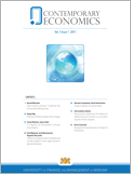The Impact of Emotional Intelligence on Work Performance: Perceptions and Reflections from Academics in Malaysian Higher Education Obitat endiaest que
The Impact of Emotional Intelligence on Work Performance: Perceptions and Reflections from Academics in Malaysian Higher Education Obitat endiaest que
Author(s): Ratneswary Rasiah, Jason J. Turner, Yew Foo HoSubject(s): National Economy, Labor relations, Higher Education , Human Resources in Economy, Globalization
Published by: VIZJA University
Keywords: Human Capital; Higher Education; Emotional Intelligence; 4th Industrial Revolution;
Summary/Abstract: Using the ‘emotional competence framework’ developed by Goleman (1998), this research aims to clarify the role that identified antecedents of emotional intelligence play on academics’ work performance. Specifically, the research will examine the relationships between self-management, self-awareness, relationship management and social awareness and work performance in higher education. The research comes as a response to the existing literature, which predominantly examines university work performance and employability from a student perspective. This perspective is usually in the context of university-led initiatives and the ability of these initiatives to engender the employability skills students require for a job and the more generic discussion surrounding how prepared graduates feel for a disruptive employment market. Examining academics’ perspectives gives some initial insight into the skill sets that academics feel they are developing in the university environment and the role that these skills play in academic performance and ultimately in their contribution to the knowledge economy. In an increasingly competitive market where workers have to compete against each other as well as the technological alternatives to human capital, namely, automation, machine learning and artificial intelligence (AI), academic and practitioner assessments of an individual’s work-readiness has gathered momentum. A gap in the literature is apparent in the perspectives of individuals who are teaching those employability skills, specifically, whether these individuals feel that those skills that are less easily automatable are being appropriately developed in their skill set. Using a survey with 103 academics from a university in Malaysia, the research addresses an identified gap in the literature around emotional intelligence and the labor market. The research also informs the wider literature on work performance and advances research in the area of employability in the context of the 4th industrial revolution.
Journal: Contemporary Economics
- Issue Year: 13/2019
- Issue No: 3
- Page Range: 269-282
- Page Count: 14
- Language: English

